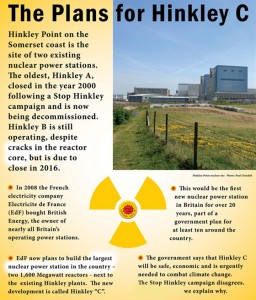Plant Closures =/= Energy Deficit
The UK government and DECC have decided that the best way to prop up the Big 6 energy companies is to give them billions to build more polluting fossil fuel plants.
The reprint of a PV Magazine article:
UK auctions capacity, sparks controversy
A capacity market auction last week led to the procurement of 49.26 GW of new capacity, mainly from fossil and nuclear fuels, at a clearing price which will cost U.K. households nearly £1 billion. The government said the capacity market is necessary to ensure the lights stay on, specifically as power from renewables increases, but the policy has sparked controversy.
National Grid, the company that owns and manages the United Kingdom’s electricity grids, has been commissioned by the Department of Energy and Climate Change (DECC) to run the country’s first capacity market auction. The auction ran for four days last week, leading to the procurement of 49.26 GW of fossil fuels-based capacity at a clearing price of £19.40 per kilowatt a year a day ahead of schedule. The auction’s gross cost is £990 million and will need to be paid after 2018, according to the DECC.
U.K. capacity market: The first round
According to the Department of Energy, the purpose of last week’s auction was to estimate how much capacity will be needed in 2018/19, which is the first year the Capacity Market will be running. “Electricity providers have then bid into this capacity auction, promising if they win a contract that they will be available to provide electricity when needed. In return, they will receive a steady payment on top of the electricity that they sell”, the DECC said.
Referring to the price bids, DECC Secretary of State Ed Davey said, “This is fantastic news for bill-payers and businesses. We are guaranteeing security at the lowest cost for consumers. We’ve done this by ensuring that we get the best out of our existing power stations and unlocking new investment in flexible plant.”
Not everyone is equally optimistic though. Last week’s auction price is near the lower end of the range of prices DECC’s financial modelling had predicted could prevail under a rolling auction scheme that aims to ensure the U.K.’s lights stay on after 2018 to 2030 and beyond. However, the billions of subsidies expected to flow to power groups in the coming years could also rise.Furthermore, the list of new investments triggered by the capacity market mechanism disappoints. The main bulk of winners in the auction are existing gas (22.3 GW), coal/biomass (9.2 GW) and nuclear (7.9 GW) power plants, while new installations will only form 2.6 GW or 5% of the capacity auctioned, including a new 1.8 GW gas plant in Trafford Park, Greater Manchester, by independent supplier Carlton Power under a 15-year contract.The DECC notes that auction results are provisional until confirmed by an independent auction monitor. Publication of confirmed results are expected on January 2, and approved bidders will need to have refurbished or built the auctioned capacity in three years. Should successful bidders not make their capacity available when needed, they will be penalized.
Capacity market: An excuse for fossil fuels?
Internationally, capacity markets have sprung out of the need to compensate utilities for the loss of their power market share due to the dynamic increase of renewable energies. Traditional power market incumbents have argued their income has been severely cut, leaving them unable to build new power plants or keep operational ones alive. Responding to this, some governments have introduced capacity markets aiming to encourage new, mainly fossil-based plants that guarantee reliability of the power system when renewable plants do not generate adequate capacity.
The U.K. is the first European country to run such a market. DECC’s main argument in favor of a capacity market is that the country is facing a looming energy supply gap as old nuclear power plants and many of its polluting coal-fired stations are due to close by the end of the decade and a capacity market will make it affordable to replace them. Otherwise, DECC argues, the country risks black-outs by as soon as 2018.
However, Michael Pollitt, professor of business economics and assistant director of the Energy Policy Research Group (EPRG) at the University of Cambridge, told pv magazine that “the whole idea of a capacity market for Great Britain was based on scare mongering about electricity supply shortages, which would not have materialized. There was no serious evidence of capacity shortages developing in the light of the anticipated evolution of supply and demand. Given the actual evolution of supply (where, if anything, renewables have been added quite quickly) and demand, which has remained flat, there would have been even less of a problem that might have been anticipated.”
Asked about the anticipated closure of large nuclear and coal power plants, Pollitt said that “large power plants are built on a replacement cycle. The fact that old
plants are due to close as planned can easily be handled by the market. This
process has been going on for nearly 25 years, since liberalization [of the British energy market in 1980s].”
Therefore, Pollitt argued, “papers which show the planned closures of power plants leading to a projected deficit in capacity are economically illiterate, because they ignore how this would lead to incentives to build new plants if these are needed.”
Renewables Energy Association (REA) Chief Executive Nina Skorupska told the audience at October’s Solar Energy UK event in England that the U.K. government is planning to auction 50 GW of fossil fuel capacity via the capacity payments mechanism, while it could have plugged the capacity gap with all kinds of renewable energy and energy storage technology that replaces fossil fuels.
Instead, the British government has chosen to devise a policy that clearly intervenes in the market. Paradoxically, this is the country that first among Europeans liberalized its domestic energy market 30 years ago and — many would say rightly — pushed Europe towards an open energy market.









